New Podcast Series: ‘United Against Antisemitism: Stories from the Field’
🎙️ New Podcast! 🎙️
We’re excited to introduce “United Against Antisemitism: Stories from the Field,” a podcast series from the Practitioners Network Against Antisemitism (EPNA) that is part of the DialoguePerspectives e.V. podcast.
In this series, we spotlight the voices of people across Europe who are working tirelessly to ensure antisemitic ideologies find no foothold. Join us as we explore their stories and learn valuable lessons from their experiences. Together, we can build pluralistic and democratic societies in Europe that stand firmly against hate.
Tune into our first episode, where Florian Eisheuer, program lead of EPNA, talks with EPNA speakers Bethany Odd from the Anne Frank Trust in the UK and Misko Stanisic from Terraforming in Serbia. They discuss the importance of building a network of civil society actors as well as give insights on their work in the UK and Serbia.
The first episode is now available on major podcast platforms, or wherever you get your podcasts. Search for “DialoguePerspectives | Podcast”. Share your thoughts with us. For feedback or comments, email practitionersnetwork@dialogueperspectives.org.
Wait for more episodes to come from now on a monthly basis.
Check-In Meeting on Antisemitism in Football
In the light of the European Football Championship, the European Practitioners Network against Antisemitism held a check-in meeting in the morning of Thursday, July 4th, 2024 focused on addressing antisemitism in football. The virtual event brought together network members to learn from and discuss with representatives from Maccabi Germany and Maccabi Great Britain, both Jewish sports clubs under the umbrella of Maccabi Europe.
They reported on their work within their respective national contexts, and both noted a recent increase in online antisemitism. Since October 7th, there has been no online post by Maccabi or UK football clubs, such as those wishing Happy Jewish Holidays, that hasn’t received antisemitic comments.
Challenges highlighted included the reluctance of sports clubs to address incidents, fearing damage to their reputations. It was noted that paying lip service is not sufficient to tackle discrimination. Additionally, reaching beyond already engaged groups to promote tolerance and respect remains a challenge. The representative from Maccabi Germany also mentioned the difficulty in addressing antisemitism, which is often seen as part of general racism or solely a historical issue linked to the Nazi era, leading to its neglect. There’s also an attitude in sports that discrimination is an inherent part of the game and that aggression is part of football.
Among others, the German project “Zusammen1” was introduced, highlighting its strategy of learning about antisemitic discrimination on the football field rather than in the classroom. This approach aims to make young people aware of the impact of antisemitic behavior by comparing it to other forms of discrimination, such as Islamophobia. Combating antisemitism in sports must address various target groups. On the one hand, it involves creating awareness among players, coaches, and other staff, as well as sensitizing the staff at football games in the stadium and engaging the fan community.
Participants of the check-in were also introduced to the importance of reporting antisemitic incidents and the initiatives that are enforcing this practice, although it remains a challenge to convince people of its relevance. The existence and significance of Jewish fan supporter groups, such as those in the UK, in raising awareness were also discussed and introduced as a good practice.
During the following Q&A session, participants followed up on these and other topics, talked about their own experiences and exchanged contact details. One of the key takeaways from the discussion was the need for more robust education and awareness programs within football organizations, among the players, the staff, as well as the fans to combat antisemitism effectively. Participants also discussed the importance of fostering an inclusive environment where all fans and players feel safe and respected.
Report on the Łódź Workshop
Workshop Report: EPNA Workshop in Łódź, June 10-12, 2024
More Liberalism, Less Antisemitism? In Times of Political Change: Finding Reliable Partners for Europe’s Pluralistic Future
The European Practitioners Network Against Antisemitism (EPNA) conducted its third gathering in Łódź, Poland, from June 10 to 12, 2024. The event, held in collaboration with the Marek Edelman Dialogue Center, brought together 30 practitioners and scholars from nine European countries to analyze the connections between the workings of liberal democracies and the prevalence of antisemitism within society. The workshop provided examples of how antisemitism is used to divide society, particularly in more illiberal democracies.
Key Discussions and Insights
In light of recent EU election results and the rise of right-wing populist parties, the importance of civil society alliances was a focal point. The workshop examined Poland’s political, social, and legal landscapes, particularly following the election of Donald Tusk and the subsequent reversal of previous authoritarian measures implemented by the PiS party. The discussions underscored the link between democratic principles and the effective combat against antisemitism.
Overcoming Authoritarian Structures:
Jakub Jaraczewski from Democracy Reporting International highlighted the challenges faced by the Polish government in restoring the rule of law. He emphasized the resilience of Poland’s decentralized civil society, which played a crucial role in last year’s political change. The discussion also highlighted Poland’s status as a ‘monocultural’ society, which poses challenges for tolerance and acceptance of diversity. Examples included anti-Ukrainian sentiments and xenophobic conspiracy theories, many of which incorporate antisemitic elements.
Status Quo of Antisemitism in Poland:
Anna Zielinska from the Czulent Jewish Association reported a dramatic rise in antisemitic incidents since October 2023, with 90.5% occurring online. The EPNA network emphasized the need for decisive action from Poland’s local and national political decision-makers as well as from civil society to address this growing issue.
Definitions and Controversies:
A critical discussion explored the different definitions of antisemitism. This session focused on whether these definitions are helpful for practitioners working on the ground, highlighting the complexity and nuances in understanding and addressing antisemitic ideologies.
Practical Exchanges and Networking
The workshop facilitated practical exchanges among European practitioners. Representatives from organizations like Wolny Klub Sportowy, Never Again Association, and Czulent Jewish Association shared their experiences and strategies. These sessions, termed “practitioners meet,” fostered strategic collaboration and intense discussions in small groups, transferring knowledge by exchanging best practices.
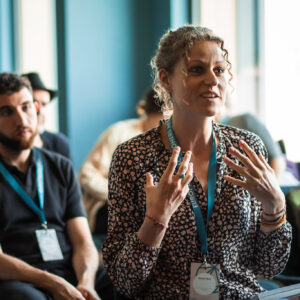

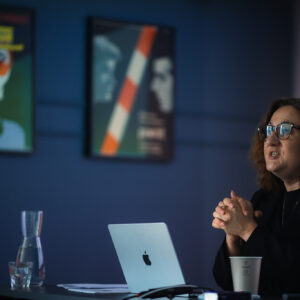
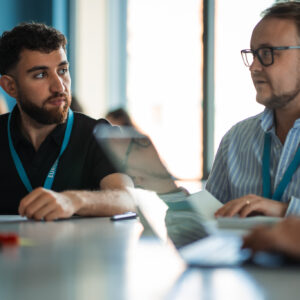
Cultural and Historical Engagement
Participants went on a guided tour through the city center of Łódź, observing the city’s recent transformations and visiting sites of the former Jewish quarter, which was fully destroyed by the Nazis during WW2. After the workshop, Jolanta Lechowska-Białecka from the Marek Edelman Dialogue Center guided some participants through the Dialogue Center and the Jewish cemetery of Łódź, deepening their understanding of the local Jewish heritage.

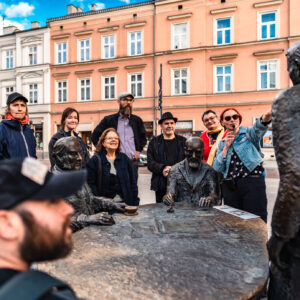
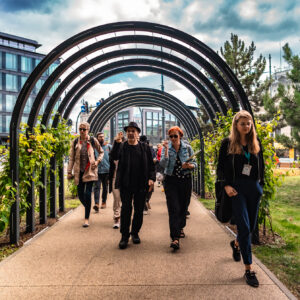

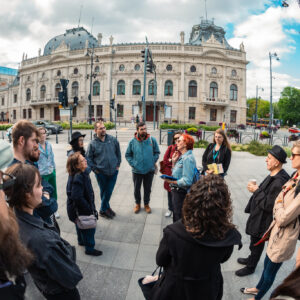
Conclusion
The workshop was a resounding success, strengthening the bonds among EPNA members and advancing their collective efforts against antisemitism. The event underscored the importance of democratic values and structures like the rule of law in combating hate and promoting a pluralistic society.
The next EPNA meeting is scheduled to take place in Serbia in the fall of 2024, continuing the network’s mission of fostering cooperation and sharing expertise in the fight against antisemitism.
Press Release: European Network Against Antisemitism met last week in Łódź
Press Release.
More Liberalism, less Antisemitism? In Times of Political Change: Finding Reliable Partners
for Europe’s Pluralistic Future. European Network Against Antisemitism meets in Łódź.
Łódź – Juni 15, 2024
In light of the results of last weekend’s EU elections and the rise of right-wing populist parties aiming to divide societies, it is more important than ever for civil society to stick together and form alliances.
The European Practitioners Network Against Antisemitism (EPNA) met in Łódź, Poland, from June 10 to 12, 2024, for its third gathering. The event was held in collaboration with the Marek Edelman Dialogue Center and brought together 30 practitioners working against antisemitism, as well as scholars from 9 European countries. The focus of the workshop was on the current situation in Poland. The discussions centered around the question of whether, following last year’s election of Donald Tusk and the subsequent rollback of illiberal and authoritarian political decisions under the PiS party, the challenge of weakening antisemitism in Poland can also be successfully addressed.
The developments in Poland were used as an example to demonstrate the connection between liberalization and the successful combat against antisemitism. The participants emphasized that the return to the rule of law and democratic principles is crucial for the effective fight against antisemitism. Florian Eisheuer, EPNA Program Director, further explains:
“Our discussions in Łódź have shown that the right political conditions at both European and national levels are crucial for effectively combating antisemitic ideologies and narratives.By promoting democratic freedoms and opportunities for participation, we can build a more inclusive and pluralistic society, thereby undermining the foundations of antisemitism.”
Key Points of the Workshop:
– Overcoming Authoritarian Structures: Jakub Jaraczewski from Democracy Reporting International highlighted the challenges currently faced by the Polish government in restoring the rule of law after eight years under the PiS government. Particularly noteworthy is Poland’s resilient and decentralised civil society, which contributed to the change of power last year. This emphasises the resilience and strength of Polish civil society actors.
– Status Quo of Antisemitism in Poland: Anna Zielinska from the Czulent Jewish Association analysed the current state of antisemitism in Poland. Since the massacre in Israel on 7 October 2023, antisemitic incidents have risen dramatically, with 90.5% of them taking place online. In these times, Poland’s civil society must take decisive action against antisemitism.
The workshop also promoted exchange among European practitioners. In working sessions, participants shared best practices and strategies in the fight against antisemitism to develop best practices.
Another network meeting will take place in Serbia in the fall of 2024.
For further information, please reach out to:
Florian Eisheuer – practitionersnetwork@dialogueperspectives.org – Mobil + 49 174 3772897

Some of EPNA workshop’s participants in front of the conference hotel
Łódź Workshop 2024 Programme Announcement
The programme for the EPNA Workshop 2024, titled “More Liberalism, Less Antisemitism? In Times of Political Change: Finding Reliable Partners for Europe’s Pluralistic Future,” is now available.
We are delighted to announce that the workshop is taking place in cooperation with the Marek Edelman Dialogue Center. Their support and collaboration are invaluable, and we are very happy to be able to work together.
The workshop features several key sessions focused on addressing antisemitism and discussing the implementation of Europe’s pluralistic and liberal values. On Monday, the workshop will commence with an input session by Jakub Jaraczewski from Democracy Reporting International, discussing the challenges and key takeaways related to undoing authoritarianism in Poland.
Tuesday will continue with an input session by Anna Zielinska from the Czulent Jewish Association, exploring the status quo of antisemitism in Poland, in the absence of a significant Jewish population in the country. The day will also include multiple working group sessions where participants will engage in collaborative discussions on best practices for practitioners working against antisemitism. In the afternoon, there will be a critical discussion on the definitions and controversies surrounding antisemitism. The day will end with a guided tour through Łódź, visiting, among other sites, the former Jewish quarter of the city.
On Wednesday, the workshop will host practitioners’ meet sessions where representatives from organizations such as Wolny Klub Sportowy, Never Again Association, and Czulent Jewish Association will share their insights and experiences. These sessions aim to foster practical exchanges and networking among participants.
This comprehensive programme is designed to provide valuable insights and foster collaboration among EPNA network members. The event will take place from June 10th to 12th, 2024, in Łódź, Poland, at the Puro Łódź Hotel.
EPNA Film is out!
Explore the European Practitioners Network against Antisemitism (EPNA) in depth through our new film. Gain insights into our mission, methods, and significance.
Watch the film here:
Special thanks to our members from Terraforming, Haver Hungary and the Tom Lantos Institute as well as to studioneukölln for their great support.
Check-In Call with editor-in-chief of Jüdische Allgemeine, 16 May 2024 at 9:00 AM
The upcoming check-in is scheduled for May 16th 2024, from 9:00 AM – 10:00 AM CET via Zoom.
Please register here if you are planning to join. Following your registration, you will receive a Zoom link on May 15th .
This check-in will be a special one, as we have the honor to welcome Phillip Peyman Engel the editor-in-chief of the Jewish newspaper Jüdische Allgemeine. It is the biggest Jewish newspaper with the highest circulation in Germany. He will give some insights into how his work has changed since October 7th and what kind of influence the newspaper tries to have when in comes to the remembrance culture of Germany.
After his presentation and a subsequent discussion + Q&A round, we will proceed as usual. We will talk about the current developments in your respective countries and give you an update on microgrants and upcoming events & plans. There can be optional space to work within your working groups, if requested.
We are looking forward to see you online.
Workshop “Antisemitism: Denial, Distortion, Disguise” in Budapest
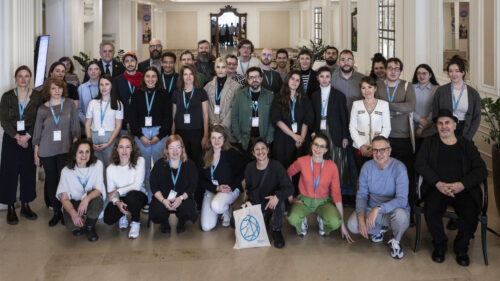
“The increasing spread of anti-Semitism across national borders and the overcoming of established political barriers require increased efforts by European networks to take proactive, not just reactive, action against anti-Semitism”. This was emphasized by Prof. Dr. Frederek Musall, Chairman of DialoguePerspectives e.V., before the second meeting of the European Practitioners Network against Antisemitism (EPNA) in Budapest from 17th – 19th April 2024.
The second EPNA network meeting brought together more than 40 civil society actors, academics and activists from all over Europe who are committed to combating antisemitism. Among the participants were representatives from educational institutions, non-governmental organizations, religious communities and research associations. The workshop focused on the development of strategies against Holocaust denial and the mobilization of civil society in the fight against anti-Semitism.
The participants and guests discussed the connection between the politics of hybrid regimes and the falsification of memory, as well as the direct impact of social polarization on democratic civil society in Europe.
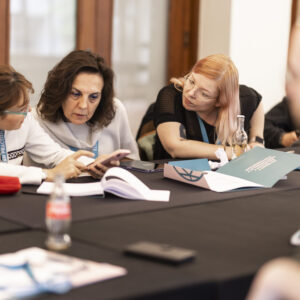
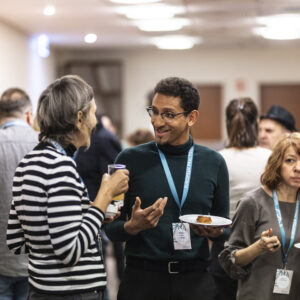

The event kicked off with Dr. Andrea Pető from the Central European University (CEU) talking about the politics of memory and Holocaust distortion in Hungary.
On the second day, attention shifted towards the collaborative efforts within interactive groups, where participants engaged in problem analysis within their respective subject domains. These groups were organized around the following themes:
1: Holocaust Education and the Fight against Holocaust Distortion/Denial,
2: Addressing Antisemitism in Schools, Universities, and Among Younger People,
3: Exploring the Intersection of Antisemitism, Racism, Conspiracy Ideology, and Misogyny,
4: Tackling Online Antisemitism, Fake News, and Online Radicalization.
In the afternoon, participants embarked on a guided tour titled “Contested lieux de mémoire,” exploring Holocaust memorials and Jewish heritage within Budapest’s city center.
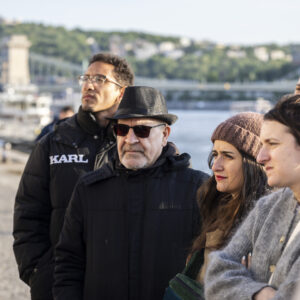

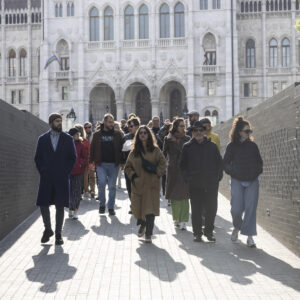
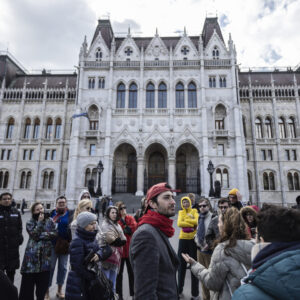
The day culminated in a panel discussion entitled “Resilient Alliances – Strategies for Mobilizing Civil Society Against Antisemitism,” featuring speakers Hannah Rose from the Institute for Strategic Dialogue (ISD) and Hanna Veiler from the European Union of Jewish Students (EUJS).


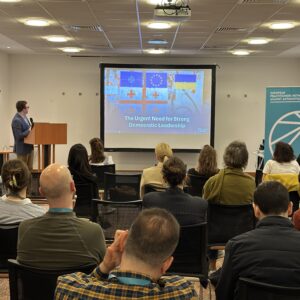
The subsequent day started with a lecture by Michael Smeltzer from Freedom House, delving into the topic of “Hybrid Regimes and Democratic Decline.” This was followed by an opportunity for participants to engage with practitioners from Hungary. Phiren Amenca introduced its initiatives as a network comprising Roma and non-Roma volunteers and voluntary service organizations, dedicated to fostering non-formal education, dialogue, and engagement to combat stereotypes and racism. Zachor Hungary provided insights into their methodology of history education and societal remembrance. Marom showcased its cultural Jewish center’s activities.
The workshop concluded with farewells, followed by a visit to the Dohány Street Synagogue.
Fotos by Ákos Kaiser
Join Us for the Summer Workshop in Łódź, 10 -12 June, 2024
We are thrilled to extend an invitation to all EPNA members and those interested in joining our community to our upcoming in-person workshop in Łódź, scheduled from June 10th to 12th, 2024.
Check-In Call with Journalist Peter Bognar, 14 March 2024 at 9:30 AM
Then next EPNA check-in call is scheduled for March 14th 2023, at 9:30 – 11:00 am CET via Zoom.

